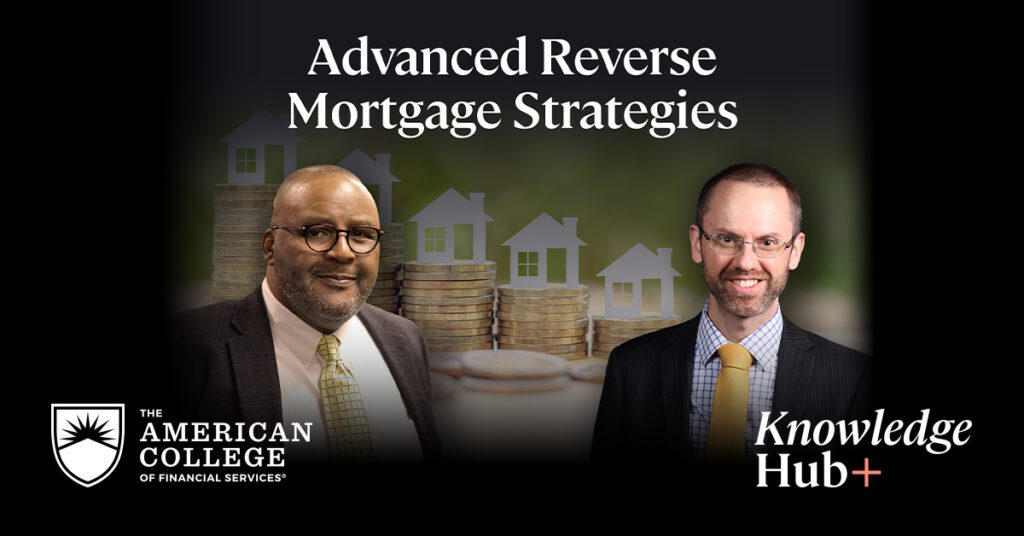Why Would Morningstar Take on This Topic?
Morningstar, one of the most venerable financial organizations in the world, recently invited me to participate in my first-ever podcast on reverse mortgages. This was an incredible opportunity to bring greater awareness to a financial tool that has evolved significantly over the years.
To provide the most comprehensive insights, I invited my friend and industry expert, Dr. Wade Pfau, to join me in the discussion.
Reverse mortgages have historically been viewed with skepticism, but in recent years, they have gained attention as a legitimate retirement planning tool.
Morningstar, known for its commitment to providing unbiased, data-driven financial insights, recognized the need to educate financial professionals and retirees alike about the evolving landscape of reverse mortgages.

With increasing longevity, rising healthcare costs, and market volatility, home equity is becoming a critical component of retirement planning. By addressing this topic, Morningstar is helping advisors explore new ways to support their clients’ financial well-being.
One of the highlights of the podcast was a deep dive into 24 critical questions about reverse mortgages. From understanding the basics of Home Equity Conversion Mortgages (HECMs) to exploring advanced strategies like managing market volatility, these questions provide a thorough foundation for advisors and clients alike.
How Have Reverse Mortgages Changed?
The reverse mortgage industry has undergone significant regulatory and structural changes over the past decade, making them safer and more flexible than ever before. Key changes include:
- Stronger Consumer Protections: Regulatory updates in 2013, 2015, and 2017 introduced financial assessments and limits on withdrawals to ensure sustainability.
- Non-Recourse Protections: Borrowers and their heirs are safeguarded from owing more than the home’s value.
- Flexible Loan Structures: Borrowers now have access to various payout options, including lump sums, monthly payments, and lines of credit.
- Increased Financial Advisor Acceptance: Organizations like the Financial Industry Regulatory Authority (FINRA) have revised their stance, acknowledging reverse mortgages as a viable retirement tool when used appropriately.
How Are Higher Net Worth Retirees Using Reverse Mortgages?
Contrary to popular belief, reverse mortgages are not just for those facing financial hardship. Increasingly, higher net worth retirees are leveraging reverse mortgages to:
- Enhance Cash Flow: By eliminating monthly mortgage payments, retirees can preserve their investment portfolios and delay withdrawals.
- Manage Market Volatility: A reverse mortgage line of credit can serve as a buffer, reducing the need to sell investments in down markets.
- Fund Long-Term Care: Housing wealth can supplement long-term care needs without depleting other assets.
- Optimize Tax Strategies: Borrowing from home equity can provide tax-efficient income while allowing other assets to continue growing.
Why Should Financial Advisors Become Informed?
As financial professionals, staying informed about all available retirement strategies is essential to providing comprehensive advice. Reverse mortgages can:
- Diversify Retirement Income Sources: Advisors can help clients create a more resilient retirement income plan by incorporating home equity.
- Address Longevity Risk: Reverse mortgages offer a sustainable way to extend retirement income without solely relying on investment accounts.
- Differentiate Their Practice: Advisors who understand and educate their clients about reverse mortgages can set themselves apart in a competitive marketplace.
Download Full Transcript
Dr. Wade Pfau and I addressed 24 key questions during our discussion, covering topics such as the basics of Home Equity Conversion Mortgages (HECMs), repayment options, regulatory changes, and practical strategies for incorporating housing wealth into retirement planning. You can Download the Full PDF Transcript Here
Chapter Guide: Skip to the Questions That Interest You Most
24 Questions
- Introductions: 00:00
- How did Don Graves Get Started in Reverse Mortgages? 01:50
- What is the Home Equity Conversion Mortgage (HECM)? 03:10
- Why did FINRA Change Their Position on Reverse Mortgages? 04:22
- Regulatory Changes in 2013, 2015, and 2017 08:00
- Why Are Consumers Required to Go Through Counseling? 10:32
- Are reverse mortgages less appropriate for those with a strong desire to leave an inheritance? – 11:34
- What does it mean that HECMs are structured as a non-recourse mortgage? 14:58
- How does the average person’s home equity compare to other retirement assets like IRAs and pensions? 16:10
- Are reverse mortgages less attractive when interest rates are higher, even with significant home price appreciation? 17:03
- What is the “lenders margin” and how does it impact loan proceeds 19:14
- What are the main payment options for using proceeds from a HECM? 20:30 Can you explain how the “principal limit” works in determining initial proceeds? 22:04
- When does the reverse mortgage need to be repaid, and what options do the family have for repayment when the borrower dies? 23:10
- How does the growing line of credit work with reverse mortgages, including an example? 25:00
- Why does opening a HECM line of credit at retirement and delaying its use until later create stronger retirement income protection? 27:40
- Explain the ‘Rule of 30′ from Barry Sacks’ 2017 paper in the Journal of Financial Planning? 30:53
- How does using a standby reverse mortgage to manage risk and volatility improve retirement success odds? 33:18
- What are the foreclosure risks associated with reverse mortgages, particularly concerning property taxes, home insurance, and repairs? 35:48
- How does the HECM for Purchase assist retirees in downsizing and alleviate financial stress? 37:35
- How can the higher closing costs of a reverse mortgage be understood? 40:00
- Main Objections from Financial Professionals? 43:25
- How can the industry address advisors with misguided incentives regarding reverse mortgages? 47:33
- Why are compliance departments concerned about reverse mortgages, and what are different approaches to address their concerns? 49:10
- Are there certain individuals who shouldn’t use a HECM? Is there a threshold of assets above which a reverse mortgage might not be necessary? 52:46
By exploring these questions, the podcast provides a comprehensive look at reverse mortgages and their potential role in financial planning. I encourage you to watch and share the episode with colleagues and clients who may benefit from this valuable discussion.
Related Posts:
- 6 Ways Reverse Mortgages Can Manage Rising Insurance Costs
- Why Waiting to Secure a Reverse Mortgage Could be a Costly Mistake
- Can a Reverse Mortgage Happen When One Spouse is Under 62?
What to Do When You Have a Client or Case?
- Go to www.HousingWealthPro.com and request an Housing Wealth Illustration. Give Details in the “Notes” Section including the clients phone # if they would like a Housing Wealth Assessment. You can also
- Schedule a Time to Speak with Me: Click Here
The content of this blog is for financial advisors and professionals only and is not intended for consumer use. Names, cases, and scenarios are fictionalized for illustrative purposes. The opinions expressed here are those of the author alone and do not reflect the views of any affiliated entities or individuals. Don Graves, NMLS #142667.







